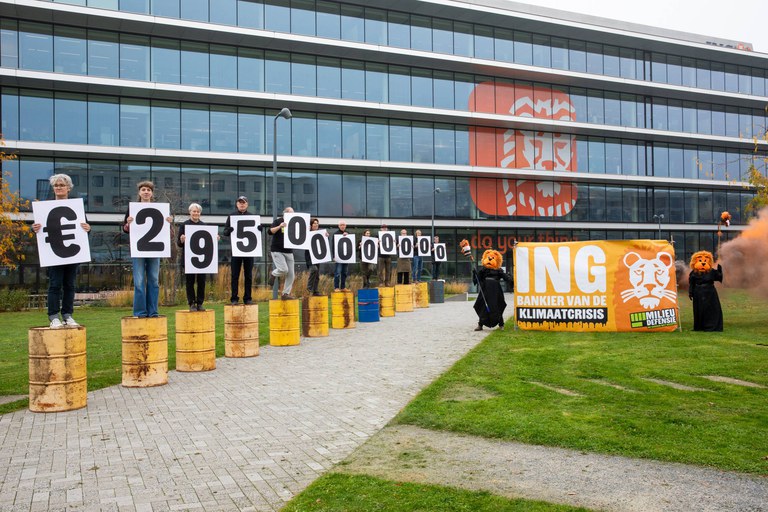The judgement in the Shell case provides a lot of support: the appeal court ruled that polluting companies must reduce their emissions, and that protection against dangerous climate change is a human right. This also applies to ING. That is why we are continuing with our climate case against ING. Here we explain why.
The court states that climate change is the biggest problem in the world right now. And that the climate crisis is caused by oil, gas and coal.
ING:
The court made it abundantly clear: “Protection from dangerous climate change is a human right.” Large, polluting companies that contribute to the climate crisis have a duty to ensure that they do not violate human rights.
This applies to all major polluting companies, including ING.

Photo: demonstration at ING headquarters © Sanne Shiratski
In the judgement, the court was ultimately unable to pinpoint a specific reduction percentage. But the judgement was very clear about something else: that all companies have a duty to reduce their CO2 emissions. And this also applies to ING.
This responsibility is even bigger for 'systemic players', or the big giants within the sector. As a 'global systemically important bank' (GSIB), ING is one of the 30 largest and most important banks in the world. ING itself says that it is responsible for 264 megatons of greenhouse gases — that is more than one and a half times what the entire country of the Netherlands emits. The court's ruling therefore also applies to ING. The bank must drastically reduce its emissions.
This concerns all emissions that companies are responsible for, including CO2 emissions from their customers or companies they work with (the so-called 'scope 3' emissions).
According to the court, starting new oil and gas fields is in conflict with with the Paris Climate Agreement. But ING pumps billions of euros into companies such as Shell that are still developing new oil and gas fields. Whether you extract the oil from the ground yourself or whether you finance the drilling, you are responsible either way. ING's choice to continue to finance companies that develop new oil and gas fields is therefore equally in conflict with the Paris Climate Agreement.
We will continue with the climate case against ING. If not, major polluters will just continue to dawdle, and we cannot wait. We’ll keep going until all polluters go green.
Photo at top: Winnie Oussoren, Donald Pols and Roger Cox during the announcement of our climate case against ING. © Edo Landwehr
Our website uses cookies to ensure the use and functionality of this website. Read more about our cookie policy